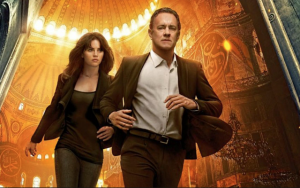Metro In Focus: The fraught relationship between faith and film
 By Richard Crouse – Metro In Focus
By Richard Crouse – Metro In Focus
This weekend professor of religious iconology and symbology Robert Langdon (Tom Hanks) returns to theatres in Inferno, the third movie in the Da Vinci Code franchise.
In 2006 the fictional Harvard prof made his big screen debut, uncovering the complicated personal life of Jesus Christ in The Da Vinci Code. Three years later he used his knowledge of symbology to unravel the mystery of a secret brotherhood called the Illuminati and thwart a terrorist act against the Vatican.
In between those two movies I received dozens of outraged emails, long tracts regarding Dan Brown’s books, the up-coming movie, The Illuminati and the veracity of the stories.
In response to the anxious folks who contacted me, concerned the film, which had not been released yet, would be a dangerous piece of anti-Catholic propaganda, I wrote a forward to my Angels and Demons review, pointing letter writers toward the Vatican newspaper L’Osservatore Romano. They described Angels and Demons as “harmless entertainment which hardly affects the genius and mystery of Christianity.” Their review noted it is filled with historical inaccuracies but went on to suggest that one could make a game of pointing out all of the film’s historical mistakes.
In other words, don’t take it seriously and you’ll have a good time. Despite the Vatican newspaper’s warm embrace, the film still ignited a firestorm of criticism from people upset about the story’s alleged anti-Catholic sentiments, “malicious myths” and churches being associated with scenes of murder.
Inferno sidesteps religious controversy with a tale of a deadly virus that threatens all of humanity, but cinema and religion have often made for uncomfortable pairings.
In 1999 the Catholic League denounced Dogma’s tale of two fallen angels (Ben Affleck and Matt Damon) trying to get back into heaven as “blasphemy.” More recently uproar erupted over Darren Aronofsky’s unorthodox take on the story of Noah. Jerry Johnson, president of the National Religious Broadcasters, loudly objected to the film’s “insertion of the extremist environmental agenda.”
Perhaps the most controversial religious film ever was The Devils, based on Aldous Huxley’s nonfiction book The Devils of Loudun. Years before Ken Russell made the movie, a filmmaker approached Huxley wanting to turn the story of a radical 17th century French Catholic priest accused of witchcraft and burned at the stake, into a film. Huxley said, ‘Don’t do it. Don’t make a movie out of this.’ He thought there was no way the story could be presented in an entertaining way without short-circuiting people’s minds. Turns out maybe he was right.
Forty-five years after its release Russell’s film is little seen but much talked about. Banned, censored and still unavailable in its complete form on Blu-Ray, the movie’s graphic church orgy offended many—and was cut to pieces and removed by censors—but it’s more than shock and titillation. It’s a film that makes a serious statement about the struggle between church and state but does so in an entertaining and provocative way.
Lots of movies contain violence or sex or religion, but Russell mixed all three together in one toxic cocktail. If released today The Devils may not inspire riots in the streets, as it did in 1971, but if presented in its complete form the following indignation would make the Angels and Demons protests seem tame.
